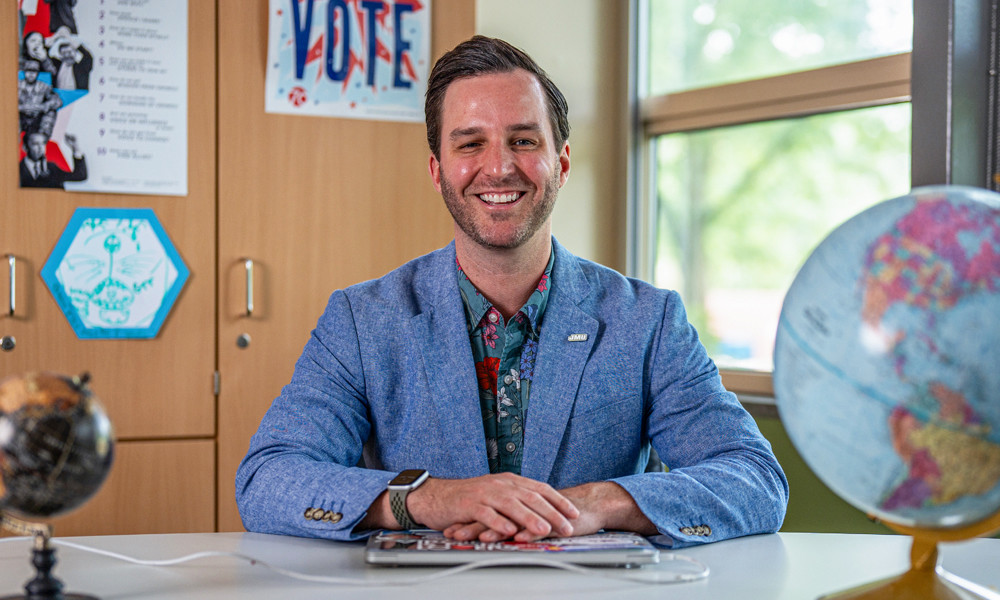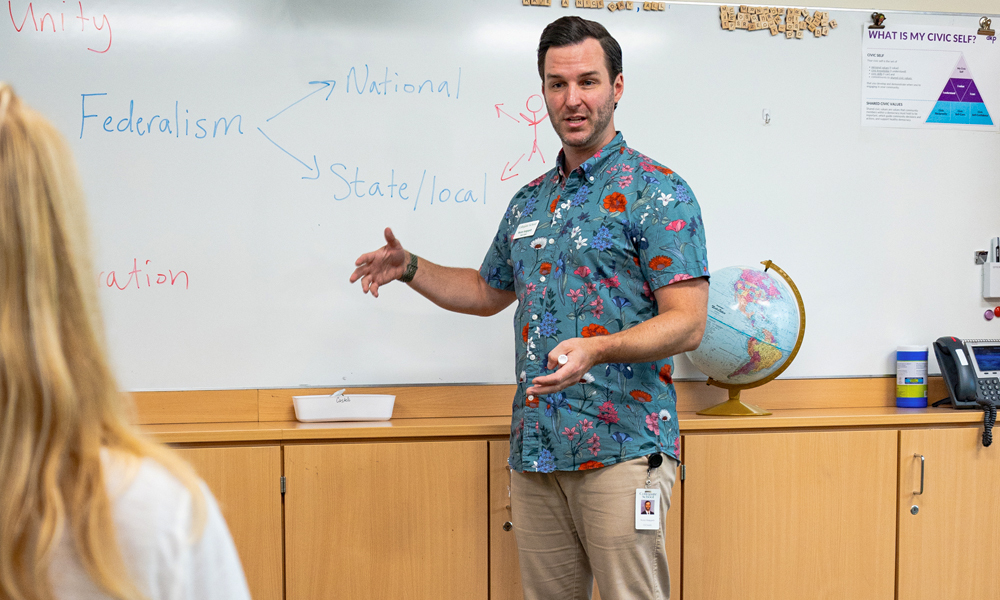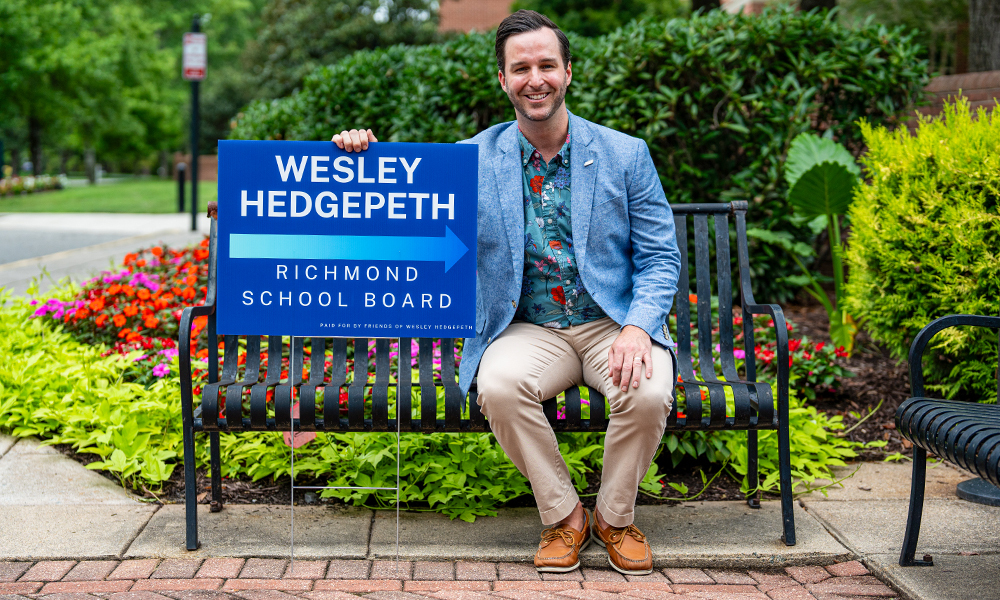The unsung heroes of democracy
Educator Wesley Hedgepeth (’08, ’09M) reveals the transformative power of social studies teachers
Featured Stories
SUMMARY: With more than 15 years of teaching experience, Wesley Hedgepeth (’08, ’09M), former president of the National Council for the Social Studies, instills in his students the importance of empathy and civility.
As a child, Wesley Hedgepeth (’08, ’09M) didn’t always feel seen or heard in school. His belief that students deserve an inclusive environment in a connected community inspired him to become a social studies educator.
Hedgepeth’s passion for teaching can be traced back to an entry in his elementary school journal, when he wrote that he wanted to be a teacher when he grew up. Over the summers, he played “Grade-It” with his little brother and assigned him homework.
“In high school, I had an AP government teacher who inspired me, and that was my favorite course,” Hedgepeth said. “In the back of my mind, I knew I wanted to do that.”
|
“Wesley has always been about making things better, more equitable, more just. He embodies the values we work so hard to instill in our future teachers: social justice, striving for curricular excellence, respect for the stories of others, empathy and care.” — Michelle Cude, professor of education |
After dabbling in political science and business as an undergraduate at JMU, he ultimately decided he needed to go where he was being called: the classroom. “At JMU, I really matured. I think that it helped me find my path,” he said. It also provided him with some of his best mentors — his grandmother, Jennie Mae (Burrow) Hedgepeth (’34), and Michelle Cude, professor of education.
“I remember Wesley and I having deep, meaningful conversations about making a difference as teachers,” Cude said. “I’m very proud of the way he really took our lessons about civic engagement to heart and ran all the way to the top. And now he both exemplifies and teaches that message of civic engagement to his students. It is the best kind of teaching … through example.”
With more than 15 years of classroom experience, Hedgepeth serves as the history and politics instructor in the Upper School at the Collegiate School in Henrico County, Virginia, whose students often apply to JMU as their top choice.
A double major in Interdisciplinary Social Sciences and Secondary Education with a Master of Arts in Teaching, Hedgepeth has committed his life to ensuring that the next generation is civically engaged and has the opportunity to achieve its full potential. “That includes elevating those who are BIPOC, LGBTQ+ and other communities that are historically marginalized,” the lifelong Central Virginia native said.

Whether teaching social studies to 12th graders or kindergartners, Hedgepeth says inquiry is the most valuable lesson. “It’s a muscle, a skill, and important at all grade levels. So students really need to exercise that muscle regularly to be informed.”
Other essential components of a healthy civic education include media literacy, civil dialogue, service learning and community-leadership opportunities. “But in the elementary area, where we’re seeing the most marginalization of social studies, these couldn’t be more important,” Hedgepeth said.
Middle school teachers are noticing gaps in incoming students’ knowledge of civics. In some cases, their first exposure to the subject is at this secondary level, Hedgepeth said.
To build a solid foundation for elementary school students, “we can define civics and what it means to be a community,” he said. “We can learn to work together and what it means to be civil with one another. Students also can understand how our government works and how it’s organized — knowing what freedom is and what rights we have. Understanding the First Amendment is a great entry point.” Hedgepeth also encourages the practice of voting as part of classroom activities.
Through verbal and written expression, elementary students can learn how to make an argument. “They’re learning how to speak, but they’re also hopefully learning how to listen and to do both civilly.”
By bringing in guest speakers and taking field trips, young children will establish role models, see what’s possible for them and their peers, and observe what makes them similar to others. “It’s paramount for students to be introduced to some people who look like them and some who don’t,” Hedgepeth said. “Representation is really, really important.”
Middle schoolers can then dive deeper into understanding how individuals and groups interact within the government. In his teaching, Hedgepeth adds emphasis on how historical movements and conflicts were resolved. Students can also fine-tune their writing and speech-making skills, learning how to support an argument.
High school civics is best suited for experiential learning. Hedgepeth encourages his students to engage in a voter-registration drive. At this age, students can reach out and lobby their elected officials on issues that interest them.
In college, students should be equipped to investigate topics and become experts to prepare them for their civic and professional lives. “Maybe they want to be in Memorial Hall like I was, learning the best from our education professors,” Hedgepeth said. “And college, too, is where we need to protect academic freedom.”

Hedgepeth points to a few causes for the nationwide marginalization of social studies. It isn’t always seen as a true discipline, he says, and its benefits often go unrecognized. “Others might be afraid of what comes from an informed citizenry, which is where you get that — in social studies.”
In some states, U.S. government and history aren’t required courses for graduation. When social studies is taught, it’s often at the end of the day, when students and teachers are tired. “And because of high-stakes, standardized testing,” Hedgepeth said, “students who need remediation in math and English language arts are often pulled out during that social studies instruction, so they miss it altogether.”
Social studies also has struggled to keep up with the increase in support for science, technology, engineering and math. Hedgepeth emphasizes that vocations in the humanities, such as historians, museum educators, anthropologists and sociologists, are equally important, but those subjects aren’t advocated as stand-alone classes in K-12. With the promise of a larger salary, careers in STEM often appeal more to students.
In general, Hedgepeth has witnessed a lack of trust, support and empowerment in education. “If we continue down the path of divestment in our teachers, we risk undermining the very foundations of freedom and justice for all, which I think is a peril too grave to ignore.”
|
“Let us be the model for civility within our classroom and throughout the world. Let our leadership influence the next generation of educators. Together, we can shape a future where every student feels like they belong and is equipped to understand and engage with our complex world.” — Wesley Hedgepeth (’08, ’09M), 2023 presidential address to the NCSS |
For Hedgepeth, the greatest honor of his professional life has been serving as president of the National Council for the Social Studies. When his term ended in July, he shifted his time and efforts toward pursuing a Fourth District school board seat in Richmond. “The Richmond Public Schools system needs better strategic oversight and a calm team player who will bring common sense and collaboration, not political divisiveness,” Hedgepeth said.
In a 2023 presidential address to the NCSS, he told the audience, “I truly believe social studies educators are our world’s civility engineers.”
“The impact of social studies teachers on civil society cannot be overstated,” Hedgepeth said. They introduce young minds to the concepts of justice, equity and civic responsibility. Through the guidance of those instructors, students learn to value diverse perspectives, engage in respectful discourse, and understand their role and responsibility in democratic society.
Social studies teachers also play an instrumental role in creating an informed citizenry who are curious and empathetic, who think critically and make decisions that affect the common good. “By fostering classroom environments where questioning and problem-solving are valued, social studies teachers contribute to the development of our future leaders who are ready to address even the most complex challenges of our world,” Hedgepeth said.
“If we care for our children, we have to care for our teachers as well,” he said. “In their hands lie the future of our vibrant and thriving democracy.”

